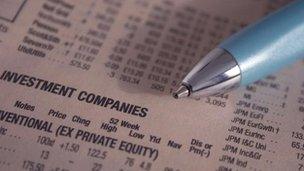Church v Wonga row: Can investments ever be ethical?
- Published

Investment funds in the UK manage billions of pounds for a range of investors
"Ethics are not just for Sunday," says the catchline on the website of the Central Finance Board of the Methodist Church.
They feature heavily in the day job for senior fund manager Stephen Beer. He has to reflect the ethical stance of the church while trying to secure a decent return on the institution's investments.
Steering clear of arms manufacturers and tobacco firms when investing the church's money may be easy, but the picture becomes more nuanced when investing in businesses that may, or may not, affect climate change.
Questions may also arise when investing in a company that sits on a supply chain that may eventually serve an "unethical" company.
"We hope that our mission statement and policies guide us, but we invest in companies around the world so we must engage with them when issues arise," he says.
The CFB's ethical policies, and the work of its advisory board, means he is confident that they hold no shares in payday lenders, or in any private equity firms that invest in payday lenders.
But he is sympathetic of the difficulties and complexities that led to embarrassment for the Church of England when it discovered it had invested indirectly in online lender Wonga.
History
About Ā£11bn was invested in green and ethical funds at the end of June last year, according to the latest data from sustainable investment research group Eiris.
The popularity and availability of these funds has mushroomed, as they accounted for Ā£4bn of investment 10 years ago.
The Archbishop of Canterbury's comments have raised the profile of ethical investment
"The credit crunch and ongoing financial crisis, plus unethical behaviour at scandal-hit High Street banks, is encouraging more people to switch to financial product providers that offer a more ethical, sustainable, and long-term approach to finance," said Mark Robertson, of Eiris, when the figures were published late last year.
And yet, the Investment Management Association says that ethical investment funds are still niche in the sector as a whole, accounting for just 1.2% of the investment industry.
Ethical investing has its roots in religion, with the Methodists and Quakers considering where their money ended up.
The first modern ethical mutual fund started in 1971 aimed at avoiding investments linked to the Vietnam war.
Some 13 years later, the Friends Provident Stewardship Fund was launched, becoming the UK's first ethical unit trust.
Now, investors in the UK have a range of funds, and pension providers, to choose from that label themselves as ethical.
Their performance, like the market as a whole, varies widely. Their size and influence can be significant.
For example, the Christian Brothers Investment Services (CBIS), which is based in the US and offers investment advice to Catholic institutions, has been vocal in calls for change at NewsCorp, founded by Rupert Murdoch.
What is ethical?
People, pension funds, and institutions that invest money ethically are often more engaged in exactly where their money goes.
But the definition of ethical can vary, depending on who you speak to. Fund managers on ethical funds select companies in which to invest using various criteria - all of which should be clear to their clients. They include:
Negative criteria - when funds actively avoid certain companies that may be involved in the arms trade, animal testing, tobacco production or gambling. Funds that use this criteria are sometimes called "dark green funds"
Positive criteria - when funds seek to support companies that have a positive effect, such as recycling businesses
Engagement - when the fund managers use the power and influence of their investment to lobby companies to change the way they operate. They manage what are often called "light green funds"
In reality, many fund managers get involved in a mix of all three.
"Each ethical fund tends to use different screening criteria and has its own definition of what is ethical," says Karine Glauser, investment research analyst at Morningstar OBSR.
"Ethical investing is a very broad topic and a lot of funds tend to be classified under this umbrella term, when actually they tend to follow very different strategies."
If a number of companies are ruled out of investment by fund managers, the choice is smaller, so the risk to investors could be greater, she says.
"When considering ethical funds, investors should be aware that the more limited investment universe would tend to be more concentrated and include smaller holdings which may make them higher risk compared to the average fund in the sector," she says.
One area that has seen a mix of ethics, religion and finance - certainly on the international scene - is the growth of Islamic finance.
The system, which is based on gaining profits in a socially responsible manner, is thought to be worth $1.3 trillion (Ā£800bn).
Some of the big banks have seen a rise in interest and have opened operations in many Muslim countries.
Back in the UK, Islamic and ethical finance remain a small segment of the industry.
But, while the Church of England has been caught up in embarrassment through its investment policy, it has inadvertently raised the profile of ethical investments.